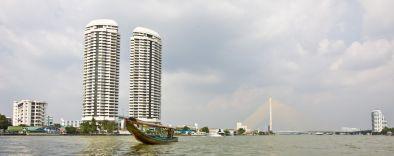Bangkok, 30.11.2010: Slums under Skyscrapers
 With innumerable high-rises, countless elegant boutiques and restaurants and big cars, at first glance the Thai capital is like the translation of its native name, Krung Thep: a city of the angels.
With innumerable high-rises, countless elegant boutiques and restaurants and big cars, at first glance the Thai capital is like the translation of its native name, Krung Thep: a city of the angels.
Yet, it has huge downsides: homeless people, slums, people at the margins of society. Unlike many other, even German, cities the observer notices that poverty is not ghettoized here. Tin shacks stand next to skyscrapers and mansions are within easy reach of the middle class blocks of flats. As in the countryside or smaller towns, everywhere the homes of the poor, the average wage earners and the wealthy stand side-by-side.
Even the country’s biggest slum in the Bangkok district of Khlong Toei is surrounded by glass palaces that reach into the skies. About 100,000 people live here. The Duang Prateep Foundation is one of the four social groups in the area committed to alleviating problems. It was named after a woman who grew up in the slums, began to teach younger children to read and write at the age of twelve and today oversees the 50 staff members of the organization, which has been awarded over 100 prizes. It is not advisable even for Thais to enter the slums alone. Heroin and other drugs, weapons, AIDS, insufficient medical care, impoverished elderly – the list of problems seems as long as the surrounding high-rises are high. My colleague Punnee and I are led into the centre of the slum by Sompit, who is recognizable from afar in her light blue polo shirt with the words “We are friends” under the symbol of two stray dogs. It is one of the most moving hours of my visit to Thailand.
“I know that I can only help a few people,” explains the 54-year-old, who herself lived in the Khlong Toei slum for over a decade. Usually it is medical care and help for the children. “But, every success is motivating,” says Sompit in a steady voice, while regretting that the children’s library set up by an aid organization is hardly used. “Even the slums have been taken over by television and comics.”
published on 30 November 2010 in Leipziger Volkszeitung.
translated by Faith Gibson-Tegethoff








